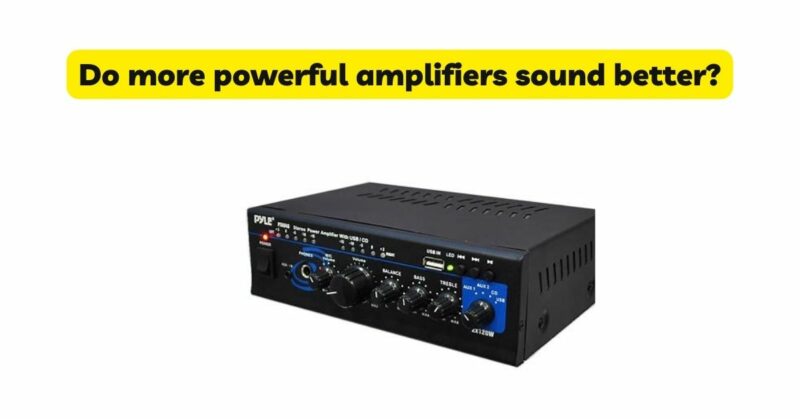Amplifiers come in various power ratings, and many musicians wonder whether more powerful amplifiers translate to better sound quality. In this article, we delve into the relationship between amplifier power and sound quality to determine whether higher wattage amplifiers offer superior sonic performance. By examining the concepts of power and headroom, exploring the influence of amplifier power on tone and dynamics, considering speaker compatibility, and understanding practical considerations, we aim to unravel the myth surrounding amplifier power and its impact on sound quality.
I. Understanding Power and Headroom
To grasp the implications of amplifier power on sound quality, it’s crucial to understand the concepts of power and headroom. Here are the key points to consider:
- Power Ratings: Amplifier power is typically measured in watts, indicating the amount of electrical power an amplifier can deliver to the speakers. Higher wattage amplifiers are capable of producing more sound pressure level (SPL) and are often associated with increased volume potential.
- Headroom: Headroom refers to the ability of an amplifier to handle dynamic peaks in a signal without distortion. Amplifiers with higher power ratings tend to offer more headroom, allowing for cleaner, distortion-free reproduction of audio signals even at higher volume levels.
II. Influence on Tone and Dynamics
Amplifier power can impact tone and dynamics in various ways. Let’s explore some of these aspects:
- Clean Headroom: Higher power amplifiers typically provide greater clean headroom, enabling the reproduction of loud, dynamic passages without unwanted distortion. This can result in improved clarity, particularly when playing at higher volume levels.
- Dynamic Range: Amplifier power affects the dynamic range, which refers to the difference between the softest and loudest sounds an amplifier can reproduce. More powerful amplifiers generally offer a wider dynamic range, allowing for greater expressiveness and nuances in musical performances.
- Speaker Control: Amplifier power influences the control and damping factor exerted over the speakers. More powerful amplifiers can better control speaker movement, leading to improved bass response, tighter lows, and enhanced overall speaker performance.
III. Speaker Compatibility
Amplifier power must be matched with appropriate speakers to achieve optimal sound quality. Consider the following points:
- Power Handling: Speakers have specific power handling capabilities, indicated by their wattage ratings. It’s important to select speakers that can handle the power output of the amplifier to prevent damage and ensure reliable performance.
- Efficiency and Sensitivity: Speaker efficiency and sensitivity ratings play a role in determining the volume and overall sound quality when paired with an amplifier. Higher power amplifiers may be necessary to drive less efficient speakers to desired volume levels without compromising sound quality.
- Impedance Matching: Proper impedance matching between the amplifier and speakers is crucial for optimal power transfer and sound quality. It’s essential to adhere to the recommended impedance values specified by the amplifier manufacturer.
IV. Practical Considerations
While amplifier power can have an impact on sound quality, it’s essential to consider practical factors when choosing an amplifier. Here are a few considerations:
- Context and Application: The intended context and application of the amplifier should be taken into account. For smaller venues or studio settings, a lower wattage amplifier may suffice, while larger venues or outdoor performances may require higher power to achieve the desired volume levels.
- Personal Preference: Sound quality is subjective, and personal preference plays a significant role in choosing an amplifier. It’s important to evaluate different amplifiers in person and assess their sonic characteristics to determine what suits your musical style and preferences.
- Tone Shaping and Features: Amplifiers offer various tone-shaping controls, such as EQ settings, gain stages, and built-in effects. Consider these features alongside power considerations, as they can significantly impact the overall sound and versatility of the amplifier.
Conclusion
The notion that more powerful amplifiers inherently sound better is not a universal truth. While higher wattage amplifiers can offer advantages in terms of clean headroom, dynamic range, and speaker control, their impact on sound quality depends on various factors. Proper speaker matching, personal preference, and practical considerations are essential when selecting an amplifier. Ultimately, the best amplifier choice is one that aligns with your musical needs, playing style, and the specific context in which you will be using it. By understanding the relationship between amplifier power and sound quality, musicians can make informed decisions that result in an amplifier that enhances their overall sonic experience.


